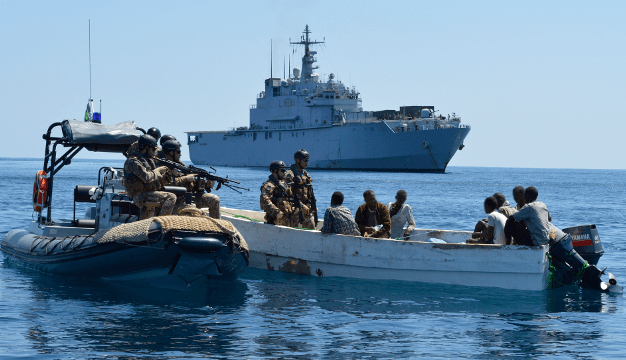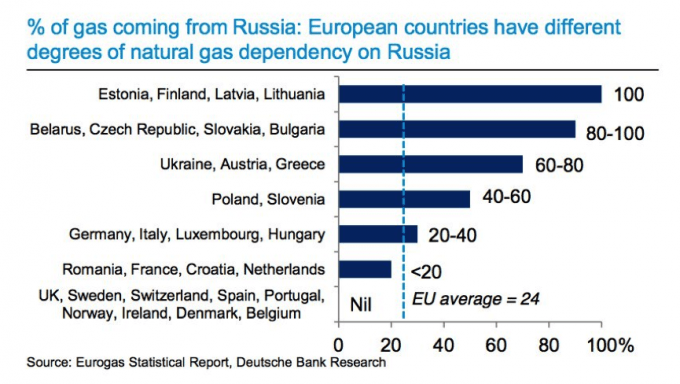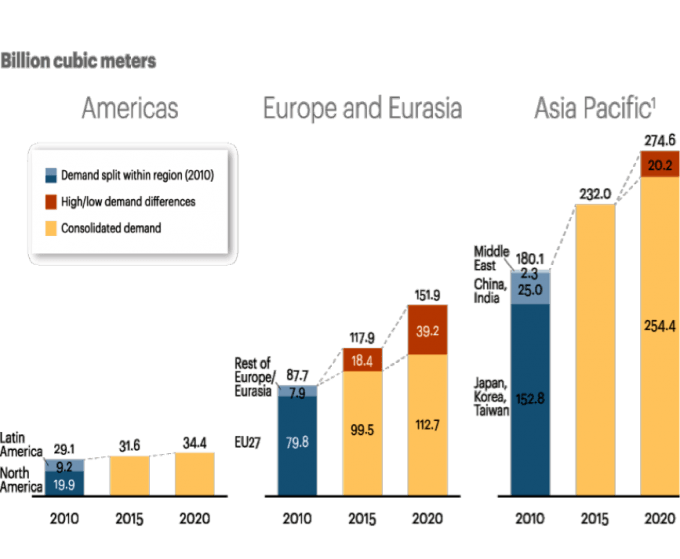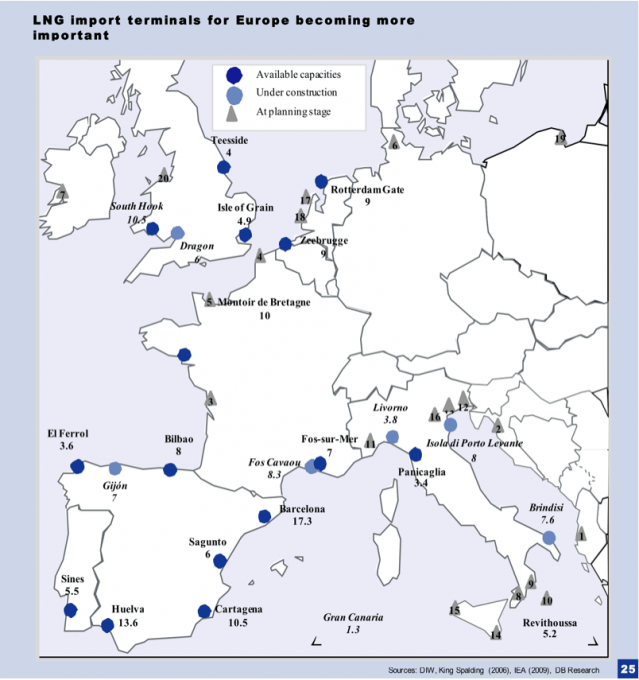Fighting Piracy to Strengthen Europe's Energy Security
June 28, 2016
on
on

Portugal and Spain can play an important role in Europe´s energy security and diversification. The import capacity of LNG by Iberian ports is huge and underused. LNG can be transported to Portuguese and Spanish ports that have the infrastructure in place to regasify and distribute it as pipeline natural gas. The two countries could contribute to Europe's energy security in two ways: upstream, contributing with the NATO, UN and European Union operations to tackle the piracy and/or terrorist threats in the maritime environment, thus securing the sea lanes and the constant and viable supply of gas and oil; and downstream, being a hub for the imports of LNG, with the capacity to regasify it, store it and distribute it as pipeline natural gas to the pipeline systems of the EU.
Energy security has become an increasingly important topic again due to recent events in Eastern Europe and the potential use (misuse!) of energy supplies as an “economic weapon” by the Russian federation. The EU imports 34% of its oil and 32% of its natural gas from the Russian federation. The following chart (Fig. 1) shows the European countries dependency on natural gas imports from Russia:
Figure 1. EU member states natural gas dependency on Russia

There are only 9 countries that have no dependency on natural gas imports from Russia; 2 of them are not EU members: Switzerland and Norway. The level of dependency of the Baltic States, Finland, Czech Republic, Slovakia, Bulgaria, Austria, Greece, Poland and Slovenia makes them very vulnerable to “energy blackmail” that Russia can impose. One of the solutions is the diversification of the supplies and the Iberian Peninsula could contribute to this objective. [1]
The importation of natural gas in its liquid form (the LNG – Liquefied Natural Gas) by maritime routes using cryogenic sea vessels is very cost efficient to transport over long distances. LNG is already being transported to Portuguese and Spanish ports that have the infrastructure to regasify and distribute it as pipeline natural gas. From there, the pipeline system of the Iberian Peninsula could connect to France across the Pyrenees and could be distributed across Europe. This is a key issue; this connection (the Midcat pipeline) is yet under study. However, it is well underway to become a reality in the near future: “The Midcat project is part of the EU list of 'Projects of Common Interest' and its strategic importance has been acknowledged in the so-called Madrid Declaration, signed on 4 March 2015 by Commission President Jean-Claude Juncker and Heads of State or Government of France, Portugal and Spain. The money will come from the Connecting Europe Facility (CEF), an EU funding programme for energy infrastructure. The grants will cover up to 50% of the actual incurred eligible costs.” [2]
As a recent study has shown: "(…) the main source of alternative gas for Europe will be the global LNG market which comprises a wide range of countries including the USA. Global LNG trade could double to 700 bcm/year by 2030 – excluding the USA that could contribute in excess of an additional 100 bcm. With nearly 200 bcm of re-gasification capacity – of which only 22% was utilized in 2013 (compared with 48% in 2010) – it is clear that Europe could import much larger volumes, depending on the global LNG supply/demand balance and prices in other regions (Asia).” [3] (Fig. 2).
Figure 2. Projected LNG demand by region

Source: International Energy Agency, Energy Information Administration, BP, Facts Global Energy, A.T.Kearney analysis.
Another study adds that: "(...) The flexibility of liquefied gas transportation offers the European market significant opportunities to diversify its gas imports. Amid rising import demand, production areas in northern and western Africa and in the Middle East (Qatar is currently the world’s leading exporter of LNG) will move to the fore as suppliers. Insufficient regasification terminals in Europe have so far prevented this potential from being fully exploited. Additional capacities are already planned (or have been built), along with the construction of newly-built gas receiving facilities.” [4] (Fig. 3).
Figure 3. LNG import terminals in Europe

Source: DIW, King Spalding (2006), IEA (2009), DB Research.
The main suppliers could be the States of the Gulf of Guinea (Nigeria, Angola and Equatorial Guinea), and in the near future Mozambique [5] and Tanzania in East Africa. The United States are already an exporter of shale gas to the European Union. The port of Sines, Portugal, received the first cargo from Cheniere’s Sabine Pass LNG export terminal in Louisiana this April. This is the first U.S. LNG cargo produced from shale gas to reach Europe. [6]
President Obama has already discussed the issue with his European partners as a strategy to contribute to the energy diversification of Europe and thus greater autonomy from Russians imports. US shale gas is considerably more economical and its supplying continuity is more reliable. This gas would have to be transported by sea; the Portuguese and Spanish ports are in the forefront as receivers.
Portugal and Spain could contribute to this strategy in two ways: upstream, contributing with the NATO, UN and European Union operations to tackle the piracy and/or terrorist threats in the maritime environment, thus securing the sea lanes and the constant and viable supply of gas and oil; and downstream, being a hub for the imports of LNG, with the capacity to regasify it, store it and distribute it as pipeline natural gas to the pipeline systems of the EU.
Furthermore, gas supply to Europe by sea should receive greater attention as one of the measures to reduce the dependence on Russian supplies. The Iberian Peninsula could become a logistic platform of reception, regasification, storage and distribution of natural gas through pipelines – like the Midcat - which across the Pyrenees could link to the European network. The natural gas supply could come from various parts of the world, including the Gulf of Guinea and elsewhere, as was mentioned before. This is not a complete solution to reduce dependence of eastern countries, and others, on Russian gas; however, it could be part of a mix of alternative solutions for that purpose.
This solution was suggested by a few analysts, including Ioannis Chapsos, who stated: “The Crimea crisis has focused our attention on the vexed question of Europe’s energy supplies. To a great extent Europe depends on Russia for its oil and gas, which gives Vladimir Putin disproportionate political leverage. One of the biggest possible alternative suppliers is the Gulf of Guinea, which is thought to have vast untapped reserves – but which is also a world epicenter of maritime crime.” [7] He adds: (…) The Gulf of Guinea, with its vast offshore oil and gas deposits, offers an ideal alternative – provided its high levels of organized crime in general and maritime crime in particular can be dealt with first.” [8] Another author, Christian Bueger, shares the same view: “(…) Piracy will only end if regional support is built and African nations act together to tackle it. So when we go to the shopping temples of our high streets or sip a cup of coffee, we should remind ourselves how vital the sea is for us – and that Africa’s security is ours as well.” [9]
Of course, this entire strategy is based upon a secure sea environment that enables the transport of energetic products. The threats of pirates, terrorists or others might jeopardize this plan. These threats have a direct impact on the costs of insurance, sea freight and route diversions, among others; the direct and indirect economic costs of insecurity at sea in the Gulf of Aden were estimated to be in the billions of dollars. [10] Thus, with a more stable and secure maritime environment, the coastal States could enjoy their resources – fishing, oil, natural gas or others - contributing in significant improvement of standards of living of their populations.
The energy security of Europe could be unattainable without the diversification of its sources and the LNG supplies could contribute immensely to it. The sea-lanes are of vital importance, so is the security of the maritime transports. The geopolitical risk of energy security could be minimized and so the Russian threats, namely to the more vulnerable countries, could be set aside. A recent study conducted by the Institute of National Defense of Portugal [11] pointed out that one of the solutions to find European alternatives to the dependence on the Russian Federation might be the rise in the LNG import: “The rise in the LNG import could be the most realistic option, notwithstanding the obstacles it may face, and decrease the present-day dependence of Europe on the Russian natural gas. Thus, it would enable the desired diversification of supplying sources.” And it adds that: “(…) despite being of lesser dimension, Portugal, just like Spain, shows potential to receive gas, regas and re-export it. In view of this, it could benefit from its support to the Spanish aims of making the Iberian Peninsula a key source of LNG export to Europe.” [12]
The latest statements produced by the President of the European Commission, Jean Claude Juncker, - which include allusions to the well-known work of the Portuguese writer José Saramago, Nobel Prize for Literature, - when, referring to the need of energetic link with the rest of Europe, he stated that one should deter the Iberian Peninsula from becoming a stone raft adrift in the Atlantic. To conclude, it is worth quoting a few of those statements, that were already mentioned, regarding the Midcat project: “(…) In Madrid, in March of this year (…) I was pleased to participate, together with President François Hollande, Prime Minister Passos Coelho and Prime Minister Mariano Rajoy, at a summit to discuss ways of struggling the energetic isolation of the Peninsula (…) We referred to the gas connections. Eight out of twelve liquid natural gas terminals in Europe are located in Portugal and Spain and have the requirements to replace the 50% of gas imports from Russia. With good connections we create the conditions to supply gas to central and Eastern Europe from the coast of the Peninsula and, thus, reduce the present-day dependence on a sole external supplier.” [13]
1. Cfr: “Portugal and Spain will go on to constitute an Iberian gas market, Mibgas, a replica of Mibel, the Iberian electricity market (…) with this step, the gas Iberian hub will be strengthened, further connections between Portugal, Spain and France will be established and eight terminals of the LNG in the Iberian Peninsula will be used as nowadays they are underused: the deep water port in Sines, Portugal, and the other seven in Spanish territory. Both countries see this as a means to help the European Union reduce gas import from Russia by 40% and this should not be under estimated in present-day eastern political instability." In: publico.pt (Accessed 22/06/2015).
2. “Midcat gas infrastructure study to receive 5.6 million euros in EU funding”. In: ec.europa.eu (Accessed 17/06/2016).
3. “Reducing European Dependence on Russian Gas: distinguishing natural gas security from geopolitics”. In: oxfordenergy.org (accessed 19/04/2015).
4. “Gas glut reaches Europe”. In: dbresearch.com (Accessed 19/04/2015).
5. “Mozambique could become the world´s third largest exporter of liquefied natural gas (LNG)” Cf. Mozambique - The Emergence of a Giant in Natural Gas. In: sptec-advisory.com (Accessed 01/10/2014).
6. “Europe gets first Sabine Pass LNG export cargo”. In: lngworldnews.com (Accessed 02/06/2016).
7. “Stopping West African piracy is vital for Europe´s Energy Security". In: theconversation.com (Accessed 18/04/2015).
8. Idem.
9. “Why fighting pirates in African Waters is crucial to our security”. In: theconversation.com (Accessed 18/04/2015).
10. “Total cost of piracy: $5.7 billion to $6.1 billion”. In: niebergall.de (Accessed 17/06/2016).
11. Fânzeres, José Manuel Ferreira “O Referencial Energético de Gás Natural Euro-Russo e a Anunciada Revolução do Shale Gas”. In: IDN Cadernos nº 16, Maio de 2015, Instituto de Defesa Nacional, Lisboa.
12. Idem.
13. Juncker, Jean Claude “Acabemos com a jangada de pedra”. In: Jornal Expresso nº 2235, 29/08/2015.
José Francisco Pavia is Professor of Political Science and International Relations at Lusíada Universities of Lisbon and Porto; Coordinator of the Lusíada Research Centre on International Politics and Security (CLIPIS) and an International Consultant.
Image: EU Naval Force flagship ITS SanGiusto captures suspected pirates - Nov 2012. Source: European Union Naval Force Somalia Operation Atalanta
Russian dependency
Energy security has become an increasingly important topic again due to recent events in Eastern Europe and the potential use (misuse!) of energy supplies as an “economic weapon” by the Russian federation. The EU imports 34% of its oil and 32% of its natural gas from the Russian federation. The following chart (Fig. 1) shows the European countries dependency on natural gas imports from Russia:
Figure 1. EU member states natural gas dependency on Russia

There are only 9 countries that have no dependency on natural gas imports from Russia; 2 of them are not EU members: Switzerland and Norway. The level of dependency of the Baltic States, Finland, Czech Republic, Slovakia, Bulgaria, Austria, Greece, Poland and Slovenia makes them very vulnerable to “energy blackmail” that Russia can impose. One of the solutions is the diversification of the supplies and the Iberian Peninsula could contribute to this objective. [1]
The LNG contribution
The importation of natural gas in its liquid form (the LNG – Liquefied Natural Gas) by maritime routes using cryogenic sea vessels is very cost efficient to transport over long distances. LNG is already being transported to Portuguese and Spanish ports that have the infrastructure to regasify and distribute it as pipeline natural gas. From there, the pipeline system of the Iberian Peninsula could connect to France across the Pyrenees and could be distributed across Europe. This is a key issue; this connection (the Midcat pipeline) is yet under study. However, it is well underway to become a reality in the near future: “The Midcat project is part of the EU list of 'Projects of Common Interest' and its strategic importance has been acknowledged in the so-called Madrid Declaration, signed on 4 March 2015 by Commission President Jean-Claude Juncker and Heads of State or Government of France, Portugal and Spain. The money will come from the Connecting Europe Facility (CEF), an EU funding programme for energy infrastructure. The grants will cover up to 50% of the actual incurred eligible costs.” [2]
As a recent study has shown: "(…) the main source of alternative gas for Europe will be the global LNG market which comprises a wide range of countries including the USA. Global LNG trade could double to 700 bcm/year by 2030 – excluding the USA that could contribute in excess of an additional 100 bcm. With nearly 200 bcm of re-gasification capacity – of which only 22% was utilized in 2013 (compared with 48% in 2010) – it is clear that Europe could import much larger volumes, depending on the global LNG supply/demand balance and prices in other regions (Asia).” [3] (Fig. 2).
Figure 2. Projected LNG demand by region

Source: International Energy Agency, Energy Information Administration, BP, Facts Global Energy, A.T.Kearney analysis.
Another study adds that: "(...) The flexibility of liquefied gas transportation offers the European market significant opportunities to diversify its gas imports. Amid rising import demand, production areas in northern and western Africa and in the Middle East (Qatar is currently the world’s leading exporter of LNG) will move to the fore as suppliers. Insufficient regasification terminals in Europe have so far prevented this potential from being fully exploited. Additional capacities are already planned (or have been built), along with the construction of newly-built gas receiving facilities.” [4] (Fig. 3).
Figure 3. LNG import terminals in Europe

Source: DIW, King Spalding (2006), IEA (2009), DB Research.
The main suppliers could be the States of the Gulf of Guinea (Nigeria, Angola and Equatorial Guinea), and in the near future Mozambique [5] and Tanzania in East Africa. The United States are already an exporter of shale gas to the European Union. The port of Sines, Portugal, received the first cargo from Cheniere’s Sabine Pass LNG export terminal in Louisiana this April. This is the first U.S. LNG cargo produced from shale gas to reach Europe. [6]
President Obama has already discussed the issue with his European partners as a strategy to contribute to the energy diversification of Europe and thus greater autonomy from Russians imports. US shale gas is considerably more economical and its supplying continuity is more reliable. This gas would have to be transported by sea; the Portuguese and Spanish ports are in the forefront as receivers.
Portuguese and Spanish contribution
Portugal and Spain could contribute to this strategy in two ways: upstream, contributing with the NATO, UN and European Union operations to tackle the piracy and/or terrorist threats in the maritime environment, thus securing the sea lanes and the constant and viable supply of gas and oil; and downstream, being a hub for the imports of LNG, with the capacity to regasify it, store it and distribute it as pipeline natural gas to the pipeline systems of the EU.
Furthermore, gas supply to Europe by sea should receive greater attention as one of the measures to reduce the dependence on Russian supplies. The Iberian Peninsula could become a logistic platform of reception, regasification, storage and distribution of natural gas through pipelines – like the Midcat - which across the Pyrenees could link to the European network. The natural gas supply could come from various parts of the world, including the Gulf of Guinea and elsewhere, as was mentioned before. This is not a complete solution to reduce dependence of eastern countries, and others, on Russian gas; however, it could be part of a mix of alternative solutions for that purpose.
This solution was suggested by a few analysts, including Ioannis Chapsos, who stated: “The Crimea crisis has focused our attention on the vexed question of Europe’s energy supplies. To a great extent Europe depends on Russia for its oil and gas, which gives Vladimir Putin disproportionate political leverage. One of the biggest possible alternative suppliers is the Gulf of Guinea, which is thought to have vast untapped reserves – but which is also a world epicenter of maritime crime.” [7] He adds: (…) The Gulf of Guinea, with its vast offshore oil and gas deposits, offers an ideal alternative – provided its high levels of organized crime in general and maritime crime in particular can be dealt with first.” [8] Another author, Christian Bueger, shares the same view: “(…) Piracy will only end if regional support is built and African nations act together to tackle it. So when we go to the shopping temples of our high streets or sip a cup of coffee, we should remind ourselves how vital the sea is for us – and that Africa’s security is ours as well.” [9]
Of course, this entire strategy is based upon a secure sea environment that enables the transport of energetic products. The threats of pirates, terrorists or others might jeopardize this plan. These threats have a direct impact on the costs of insurance, sea freight and route diversions, among others; the direct and indirect economic costs of insecurity at sea in the Gulf of Aden were estimated to be in the billions of dollars. [10] Thus, with a more stable and secure maritime environment, the coastal States could enjoy their resources – fishing, oil, natural gas or others - contributing in significant improvement of standards of living of their populations.
Conclusions
The energy security of Europe could be unattainable without the diversification of its sources and the LNG supplies could contribute immensely to it. The sea-lanes are of vital importance, so is the security of the maritime transports. The geopolitical risk of energy security could be minimized and so the Russian threats, namely to the more vulnerable countries, could be set aside. A recent study conducted by the Institute of National Defense of Portugal [11] pointed out that one of the solutions to find European alternatives to the dependence on the Russian Federation might be the rise in the LNG import: “The rise in the LNG import could be the most realistic option, notwithstanding the obstacles it may face, and decrease the present-day dependence of Europe on the Russian natural gas. Thus, it would enable the desired diversification of supplying sources.” And it adds that: “(…) despite being of lesser dimension, Portugal, just like Spain, shows potential to receive gas, regas and re-export it. In view of this, it could benefit from its support to the Spanish aims of making the Iberian Peninsula a key source of LNG export to Europe.” [12]
The latest statements produced by the President of the European Commission, Jean Claude Juncker, - which include allusions to the well-known work of the Portuguese writer José Saramago, Nobel Prize for Literature, - when, referring to the need of energetic link with the rest of Europe, he stated that one should deter the Iberian Peninsula from becoming a stone raft adrift in the Atlantic. To conclude, it is worth quoting a few of those statements, that were already mentioned, regarding the Midcat project: “(…) In Madrid, in March of this year (…) I was pleased to participate, together with President François Hollande, Prime Minister Passos Coelho and Prime Minister Mariano Rajoy, at a summit to discuss ways of struggling the energetic isolation of the Peninsula (…) We referred to the gas connections. Eight out of twelve liquid natural gas terminals in Europe are located in Portugal and Spain and have the requirements to replace the 50% of gas imports from Russia. With good connections we create the conditions to supply gas to central and Eastern Europe from the coast of the Peninsula and, thus, reduce the present-day dependence on a sole external supplier.” [13]
1. Cfr: “Portugal and Spain will go on to constitute an Iberian gas market, Mibgas, a replica of Mibel, the Iberian electricity market (…) with this step, the gas Iberian hub will be strengthened, further connections between Portugal, Spain and France will be established and eight terminals of the LNG in the Iberian Peninsula will be used as nowadays they are underused: the deep water port in Sines, Portugal, and the other seven in Spanish territory. Both countries see this as a means to help the European Union reduce gas import from Russia by 40% and this should not be under estimated in present-day eastern political instability." In: publico.pt (Accessed 22/06/2015).
2. “Midcat gas infrastructure study to receive 5.6 million euros in EU funding”. In: ec.europa.eu (Accessed 17/06/2016).
3. “Reducing European Dependence on Russian Gas: distinguishing natural gas security from geopolitics”. In: oxfordenergy.org (accessed 19/04/2015).
4. “Gas glut reaches Europe”. In: dbresearch.com (Accessed 19/04/2015).
5. “Mozambique could become the world´s third largest exporter of liquefied natural gas (LNG)” Cf. Mozambique - The Emergence of a Giant in Natural Gas. In: sptec-advisory.com (Accessed 01/10/2014).
6. “Europe gets first Sabine Pass LNG export cargo”. In: lngworldnews.com (Accessed 02/06/2016).
7. “Stopping West African piracy is vital for Europe´s Energy Security". In: theconversation.com (Accessed 18/04/2015).
8. Idem.
9. “Why fighting pirates in African Waters is crucial to our security”. In: theconversation.com (Accessed 18/04/2015).
10. “Total cost of piracy: $5.7 billion to $6.1 billion”. In: niebergall.de (Accessed 17/06/2016).
11. Fânzeres, José Manuel Ferreira “O Referencial Energético de Gás Natural Euro-Russo e a Anunciada Revolução do Shale Gas”. In: IDN Cadernos nº 16, Maio de 2015, Instituto de Defesa Nacional, Lisboa.
12. Idem.
13. Juncker, Jean Claude “Acabemos com a jangada de pedra”. In: Jornal Expresso nº 2235, 29/08/2015.
José Francisco Pavia is Professor of Political Science and International Relations at Lusíada Universities of Lisbon and Porto; Coordinator of the Lusíada Research Centre on International Politics and Security (CLIPIS) and an International Consultant.
Image: EU Naval Force flagship ITS SanGiusto captures suspected pirates - Nov 2012. Source: European Union Naval Force Somalia Operation Atalanta
Read full article
Hide full article


Discussion (0 comments)